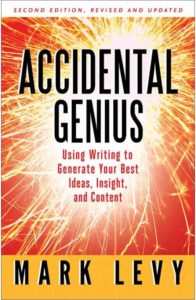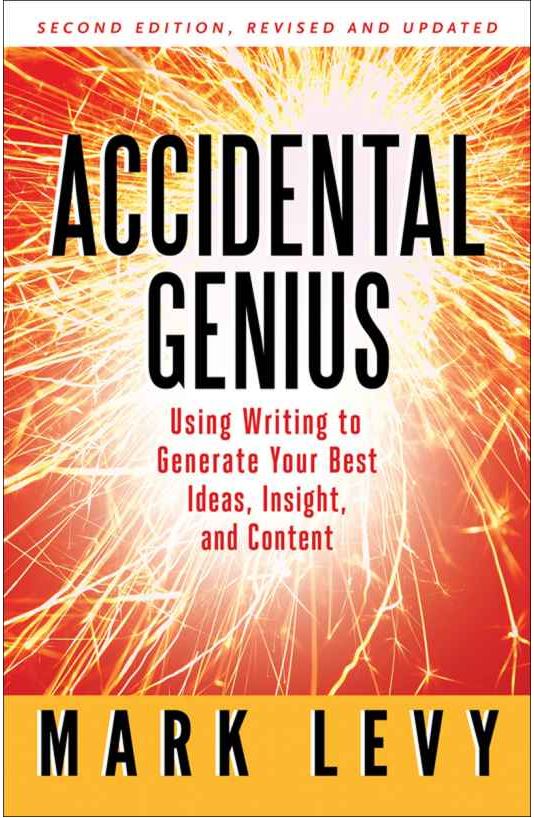Accidental Genius: Using Writing to Generate Your Best Ideas, Insight, and Content by Mark Levy
This book discusses the many benefits of the freewriting technique, which inspired my Flash Writing technique. The concept is the same. Write as fast as you can, write in timed writing sessions, don’t edit and write at the same time, etc. This book focuses on the use of freewriting in problem solving for business managers, marketers and content creators.
This doesn’t lessen the book’s value for the professional writer because most of these techniques are applicable to the freelancer or starving novelist. Because when you think about it, isn’t researching your next book or creating an outline for your next novel a problem to solve? Your problem product is a creative product, whether it is a book compiling the world’s best bologna sandwich recipes or your historical epic novel series which takes place in the suburbs of Cleveland in the 1970’s. These creative products have problems and blockages just like the engineers trying to reinvent the jackhammer, or scientists trying to determine if there is life on other worlds.
The strength of this book is in the examples Mark Levy uses to illustrate The Six Secrets to Freewriting and Powerful Refinements to these Six Secrets. He uses his own freewriting sessions to show the reader how the process works along with questions to help get the reader started.
The book is comprised of short chapters, most of them 4 to 6 pages long, all with brief summaries of the key information at the end of each chapter (the Points to Remember section) along with a Try This exercise to invite the reader to learn the concept by putting it into action.
Accidental Genius is a detailed textbook about how to best use freewriting for any kind of problem solving and goes into specifics on ways to focus your freewriting sessions to get good results. For example, Chapter 9 – Open Up Words provides a framework for you to select a word that has importance to you, either in your daily experience or one that you encounter frequently and allows you to redefine it in such a way that it has a deeper meaning for you and provides new insight into it. 
Levy is also a huge fan of using prompts, using open-ended statements or questions, quotations, or facts as starting points to think about your problems, life or story. Although his focus is more towards solving business and management problems, these techniques have been favorite warm up exercises for writers of every creed for decades.
The one concept I like the most in this book is in Chapter 27 – The Fascination Concept where Levy asks the reader to:
“… make a list. What kind of list? It’s an inventory of everything that fascinates them at any point in their lives…”
And then he encourages writers to jot down every dream, fact, figure, role model, memory and influence that has interested them at some point during their lives. His list is much longer and more specific than the few examples I’ve listed here, and his suggestions in this chapter alone can keep you writing for months, if not years.
This is a solid instructional writing book to help you learn how to adapt and focus freewriting for useful content. I highly recommend it.
Rating: ***** — Well Worth it at Full Retail Price ($11.40 Trade PB and $9.99 Kindle eBook)
Buy it from Amazon Here: Accidental Genius
About Ratings: ***** — Well Worth it at Full Retail Price; **** — Buy on Sale/Discounted; *** — Buy Used; ** — Borrow It from the Library; * — Waste of a Good Tree
